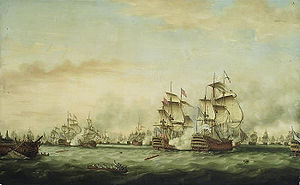HMS Barfleur (1768)
 The Battle of the Saintes, 12 April 1782: surrender of the Ville de Paris by Thomas Whitcombe, painted 1783, shows Hood's Barfleur, centre, attacking the French flagship Ville de Paris, right, at the Battle of the Saintes. | |
| Career (UK) | |
|---|---|
| Name: | HMS Barfleur |
| Ordered: | 1 March 1762 |
| Builder: | Chatham Dockyard |
| Launched: | 30 July 1768 |
| Honours and awards: |
Participated in: |
| Fate: | Broken up, 1819 |
| General characteristics [1] | |
| Class and type: | Barfleur-class ship of the line |
| Tons burthen: | 1947 tons (1978.2 tonnes) |
| Length: | 177 ft 6 in (54.10 m) (gundeck) |
| Beam: | 50 ft 3 in (15.32 m) |
| Depth of hold: | 21 ft (6.4 m) |
| Propulsion: | Sails |
| Sail plan: | Full rigged ship |
| Complement: | 750 officers and men |
| Armament: |
90 guns:
|
HMS Barfleur was a 90-gun second rate ship of the line of the Royal Navy, designed by Sir Thomas Slade on the lines of the 100-gun ship Royal William, and launched at Chatham Dockyard on 30 July 1768,[1] at a cost of £49,222. In about 1780, she had another eight guns added to her quarterdeck, making her a 98-gun ship; she possessed a crew of approximately 750. Her design class sisters were the Prince George, Princess Royal, and Formidable. She was a ship of long service and many battles.
In June 1773, King George III reviewed the British fleet at Spithead. Barfleur, under Captain Edward Vernon, was on this occasion the flagship of the fleet commander, Vice-Admiral Thomas Pye.
She distinguished herself as the flagship of Rear-Admiral Samuel Hood on the Leeward Islands station during the American War of Independence. Under Captain John Knight, she was flagship at the indecisive action of 28 April 1781 off Martinique against the French fleet of Rear-Admiral Comte de Grasse, at which Barfleur lost 5 men killed.
She next took part in the battles of the Chesapeake, St. Kitts and the Saintes. At the Battle of the Chesapeake on 5 September 1781, under Captain Alexander Hood (later Lord Bridport), she was again the flag of Samuel Hood, second in command to Rear-Admiral Thomas Graves, 1st Baron Graves. The battle was lost to the French under de Grasse, which had a profound effect on the outcome of the American war.
She saw further action in the French Revolutionary and Napoleonic Wars, taking part in Richard Howe's victory at the Glorious First of June as the flagship of Rear-Admiral (W) George Bowyer, with Captain Cuthbert Collingwood in 1794. In this battle she engaged the French Indomptable on 29 May and took a major part in the general action of 1 June, with a total loss of 9 killed and 25 wounded.
She later saw action under Lord Bridport at the Battle of Groix. In 1797 she was with Admiral Jervis at the Battle of Cape St Vincent.
Her final battle was fought under Admiral Sir Robert Calder at the Battle of Cape Finisterre in 1805.
After the conclusion of the Napoleonic wars, Barfleur spent some years in the fleet reserve (the Ordinary) at Chatham, and was finally broken up there in January 1819.[2]
Notes
References
- Lavery, Brian (2003) The Ship of the Line - Volume 1: The development of the battlefleet 1650-1850. Conway Maritime Press. ISBN 0-85177-252-8.
- Michael Phillips. Barfleur (98) (1768). Michael Phillips' Ships of the Old Navy. Retrieved 31 August 2008.
